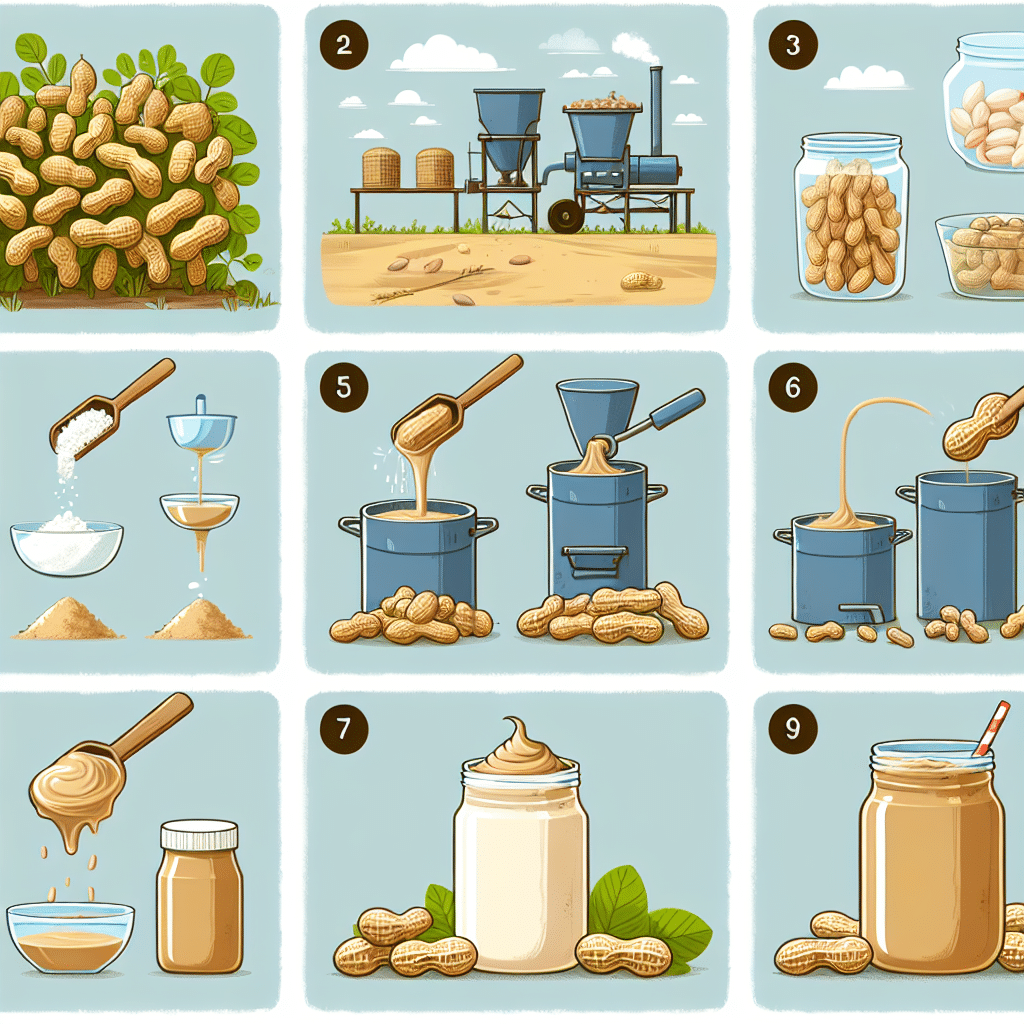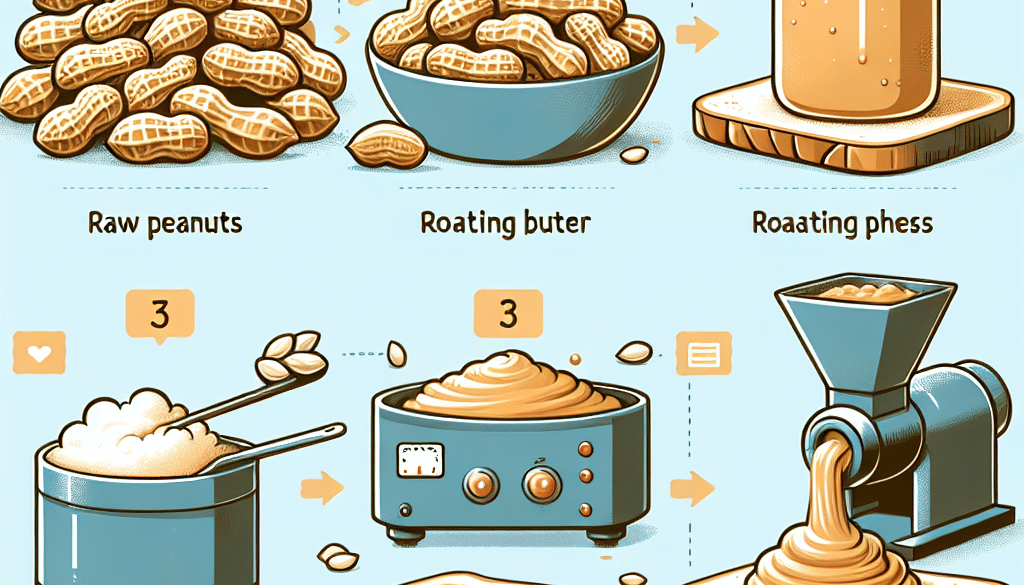Is Peanut Butter Processed? Unpacking The Spread Facts
-
Table of Contents
- Is Peanut Butter Processed? Unpacking the Spread Facts
- Understanding Peanut Butter Processing
- Types of Peanut Butter: From Natural to Highly Processed
- Nutritional Considerations of Processed Peanut Butter
- Case Studies and Statistics: The Peanut Butter Market
- Choosing the Right Peanut Butter
- Conclusion: Embracing the Spread Spectrum
- Discover ETprotein’s High-Quality Protein Products
Is Peanut Butter Processed? Unpacking the Spread Facts

Peanut butter is a staple in many households, loved for its creamy texture and rich, nutty flavor. It’s a versatile spread that can be found in kitchen pantries around the world, used in everything from sandwiches to smoothies. But with the increasing consumer interest in healthy eating and whole foods, many are questioning the processing involved in making peanut butter. In this article, we’ll delve into the facts about peanut butter production and determine how processed this popular spread really is.
Understanding Peanut Butter Processing
The journey from peanut to peanut butter involves several steps, each of which can affect the final product’s healthfulness and nutritional value. Here’s a breakdown of the typical peanut butter-making process:
- Harvesting: It all starts with harvesting peanuts from the ground, where they grow in shells as part of the plant’s root system.
- Shelling: The peanuts are then shelled, removing the outer husk to reveal the edible seeds inside.
- Roasting: Next, the peanuts are usually roasted to enhance their flavor and make them easier to grind. Roasting temperatures and times can vary, impacting the taste and color of the peanut butter.
- Grinding: The roasted peanuts are ground into a paste. The level of grinding determines whether the peanut butter will be crunchy or smooth.
- Mixing: Additional ingredients such as salt, sweeteners, and oils may be added to achieve the desired flavor and texture.
- Packaging: Finally, the peanut butter is packaged in jars or containers for distribution and sale.
Throughout this process, the degree of processing can vary significantly depending on the brand and type of peanut butter. Some brands offer “natural” peanut butter, which typically contains just peanuts and perhaps a bit of salt, while others add oils, sugars, and stabilizers to their products.
Types of Peanut Butter: From Natural to Highly Processed
Not all peanut butters are created equal. Here’s a look at the spectrum of peanut butter processing:
- Natural Peanut Butter: This type contains only peanuts and sometimes a small amount of salt. It often has a layer of oil at the top, which requires stirring before use.
- Traditional Peanut Butter: These products usually contain added oils, sugar, and stabilizers to prevent separation and extend shelf life.
- Reduced-Fat Peanut Butter: To lower the fat content, some of the natural peanut oils are replaced with other types of less saturated fats and additional stabilizers.
- Flavored or Specialty Peanut Butter: These varieties can include additional ingredients like honey, chocolate, or other flavorings, increasing the level of processing.
The more ingredients and steps involved in the production, the more processed the peanut butter is considered to be. However, it’s important to note that “processed” doesn’t automatically mean “unhealthy.” The key is to understand what is being added to your peanut butter and why.
Nutritional Considerations of Processed Peanut Butter
When assessing the healthfulness of peanut butter, it’s crucial to look at the nutritional content. Here are some factors to consider:
- Fat Content: Peanuts are naturally high in fat, but it’s mostly monounsaturated and polyunsaturated fats, which are considered heart-healthy.
- Sugar and Salt: Added sugars and salt can turn peanut butter from a healthy choice to a less desirable one, especially for those watching their sugar intake or blood pressure.
- Preservatives and Stabilizers: Some peanut butters contain additives to maintain texture and freshness. While these are generally recognized as safe, some consumers prefer to avoid them.
It’s also worth noting that peanut butter is a good source of protein, fiber, vitamins, and minerals. The key is to choose a product with minimal added ingredients to maximize these benefits.
Case Studies and Statistics: The Peanut Butter Market
Consumer demand for healthier options has influenced the peanut butter market. According to a report by Grand View Research, the global peanut butter market size was valued at USD 3.4 billion in 2018 and is expected to grow. This growth is partly due to the rising awareness of the health benefits associated with the consumption of peanut butter.
Brands that offer natural and organic peanut butter options have seen an increase in sales, as more consumers seek out products with shorter ingredient lists and without added sugars or hydrogenated oils. This shift in consumer preferences is a clear indication that while peanut butter is a processed food, there is a growing demand for less processed varieties.
Choosing the Right Peanut Butter
When selecting a peanut butter, consider the following tips:
- Read the ingredient label carefully. The fewer ingredients, the less processed the peanut butter is likely to be.
- Look for brands that do not add sugars, hydrogenated oils, or excessive salt.
- Consider organic options to avoid pesticides and other chemicals.
- If oil separation is a concern, opt for natural peanut butter with added palm oil, which is less processed than hydrogenated oils.
By making informed choices, you can enjoy peanut butter as part of a balanced and healthy diet.
Conclusion: Embracing the Spread Spectrum
In conclusion, peanut butter does undergo processing, but the level of processing can vary widely. From natural, one-ingredient spreads to more complex, flavored varieties, there’s a type of peanut butter to suit every preference and dietary need. By understanding the production process and reading labels carefully, consumers can make choices that align with their health goals and enjoy this delicious spread without guilt.
Discover ETprotein’s High-Quality Protein Products
If you’re looking for additional ways to incorporate healthy proteins into your diet, consider exploring ETprotein’s range of organic bulk vegan protein and plant proteins. Their products, including Organic rice protein, clear rice protein, pea protein, clear pea protein, pumpkin seed protein, sunflower seed protein, mung bean protein, and peanut protein, are characterized by a neutral taste and non-GMO, allergen-free attributes. Catering to a diverse range of industries, ETprotein ensures that you have access to the highest quality protein products for your nutritional needs.
About ETprotein:
ETprotein, a reputable protein Chinese factory manufacturer and supplier, is renowned for producing, stocking, exporting, and delivering the highest quality organic bulk vegan protein and plant proteins. They include Organic rice protein, clear rice protein, pea protein, clear pea protein, pumpkin seed protein, sunflower seed protein, mung bean protein, peanut protein etc. Their offerings, characterized by a neutral taste, non-GMO, allergen-free attributes, cater to a diverse range of industries. They serve nutraceutical, pharmaceutical, cosmeceutical, veterinary, as well as food and beverage finished product distributors, traders, and manufacturers across Europe, USA, Canada, Australia, Thailand, Japan, Korea, Brazil, and Chile, among others.
ETprotein specialization includes exporting and delivering tailor-made protein powder and finished nutritional supplements. Their extensive product range covers sectors like Food and Beverage, Sports Nutrition, Weight Management, Dietary Supplements, Health and Wellness Products, and Infant Formula, ensuring comprehensive solutions to meet all your protein needs.
As a trusted company by leading global food and beverage brands and Fortune 500 companies, ETprotein reinforces China’s reputation in the global arena. For more information or to sample their products, please contact them and email sales(at)ETprotein.com today.












